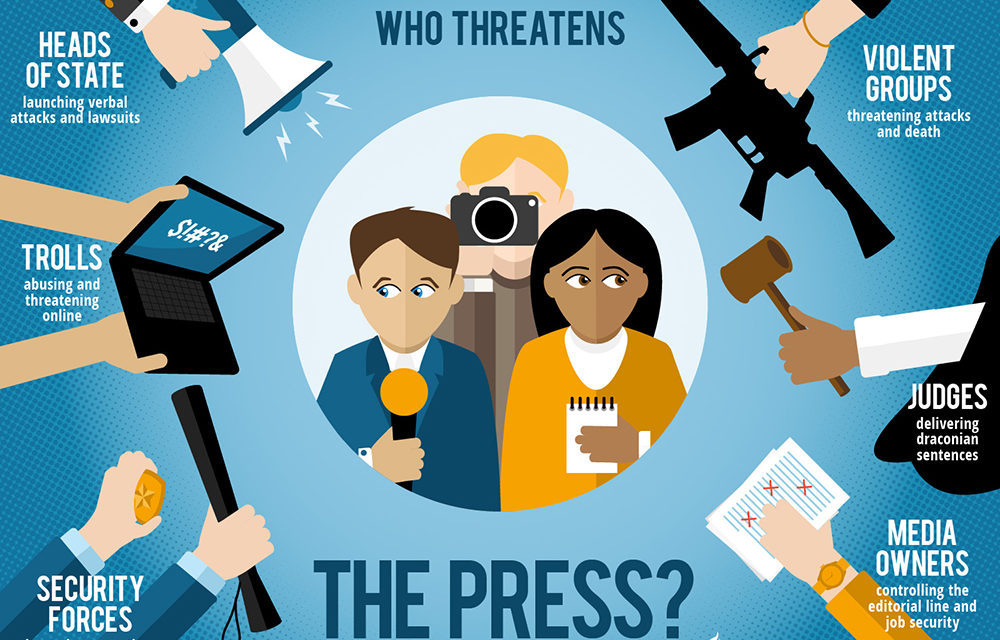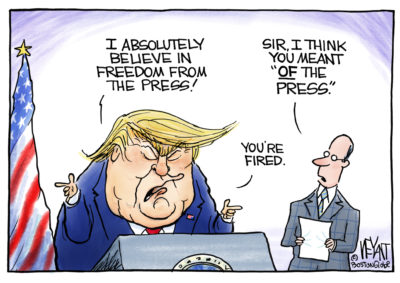It has already been a highly emotional year. The pandemic known as COVID-19, an economic crisis, a national focus on policing and social injustice, is capped by the rhetoric of the 2020 election season; complete with documented meddling by foreign governments in our election. With this as a backdrop, there appears to be a broad misunderstanding of the role of the news media in a democracy; specifically, there is confusion about the various types of communications — what they are — and what they aren’t.
As early as 2015 and on a continuing basis, a certain candidate (no less than President Donald Trump) attempted to label journalists and the news media as “enemies of the people”. He has led hate messaging aimed at members of the media covering his campaign events, incited violence against journalists, and in incessant tweeting, has perpetuated inaccuracies and outright falsehoods, while pillorying news media that point out his lies.
That mantra has been picked up and amplified by both his political party and foreign disinformation campaigns in a manner that is both inaccurate and damaging to the role of the press in a free society.
Consider that the founders of this country saw a free press as so critical to democracy that they wrote it into the constitution. The First Amendment to the United States Constitution provides that “Congress shall make no law … abridging the freedom of speech, or of the press.”
Having experienced British control of the press, and propaganda, and led by such firebrands as Benjamin Franklin, Thomas Paine, Alexander Hamilton and Thomas Jefferson, they believed in the transparent reporting of government actions.
Over the decades and centuries, interpreting that protection has stood up fairly well, with some exceptions.
During the 19th century, party-controlled major newspapers published yellow journalism and took bribes. Adolf Hitler took weaponizing government propaganda to extremes. In the last decade, the rise of party-oriented pseudo-news organizations has morphed into propaganda machines, that feature “alternative facts” and full-blown foreign disinformation efforts.
It’s enough to confuse the general public, who may not understand the differences between the information they are seeing or reading in the news. This is a rundown:
News articles – these are fact-based articles that provide coverage, either before an event or about an event or an issue. Coverage should include what happened, who was involved, how it occurred, what decisions were made, and if it can be ascertained – why it happened.
At Ark Valley Voice, we often include quotes from the people involved or questions and viewpoints expressed by the public during public comment. We also point out open issues and unanswered questions. We often return to the topic as meetings continue, issues and conditions evolve, and new information is presented. In these pieces, our journalists’ opinions don’t matter; the facts do.
The real news arena has been attacked in recent years, as marketing pieces masquerading as news have increased. As the 2020 election nears, there is a deluge of disinformation being pushed out across the U.S., especially from foreign governments and especially on social media. Russia is repeating its election interference just as it did in the 2016 election.
These disinformation campaigns have a political agenda: they exist to mislead the public, purposely attempting to influence public opinion. They are frequently opinions being presented as if they were fact, but lacking claims substantiation.
Editorials – these are opinion-based written pieces that express a point of view or take a position on an issue or topic. They are identified as opinion. At Ark Valley Voice we occasionally accept guest opinions. We also publish our relatively rare “Our Voice” editorials. These editorials are all clearly identified as guest opinions, or as “Our Voice” pieces.
It should be noted that at AVV, we do occasionally take positions on ballot questions or issues affecting our community. We do this not just as a Managing Editor decision, but often as the AVV Crew of reporters covering the issues shaping our community, our state and our nation.
When AVV began in 2018, we made an editorial decision that we will not endorse political candidates, for two reasons. First, we want you to be assured that our reporting is not being done from a position of opinion, but from facts. Second, by election time, if we are doing our journalists’ role, then we have informed you about the candidates, their experience, their platforms, and their position on the issues so that as an informed population you make your decisions.
Letters to the Editor (LTEs) – As this category clearly identifies them, these are letters addressed to the editor expressing a personal viewpoint or an opinion. Per our standards, these letters cannot libel or slander another individual, a group or another’s opinion; if so will not be published.
If LTEs include claims, these must be substantiated via links or named sources. It should be noted that according to the Congressional Research Service Report on Freedom of Speech and the Press “Some types of speech may be more easily constrained than others. Furthermore, speech may be more easily regulated depending upon the location at which it takes place … the Supreme Court has interpreted the guarantee of freedom of speech and press to provide no protection or only limited protection for some types of speech; for example, the Court has decided that the First Amendment provides no protection for obscenity, child pornography, or speech that constitutes what has become widely known as ‘fighting words’.”
The Role of Journalist is not for the Faint-hearted
One final note about journalists and how seriously the mission to speak the truth and inform the public is taken.
Journalists today follow in the footsteps of Bob Woodward and Carl Bernstein, Ida B. Wells and William Shirer, Walter Cronkite, and Ernie Pyle, Paul Revere, and Thomas Jefferson. Our role is often to give a voice to the voiceless and overlooked the railroaded, and the marginalized.
Our work can be dangerous because there are those who don’t want the truth to be told. Journalists covering the Black Lives Matter protests have been targeted by police. Just in the past few years, 26 journalists around the world have been killed; caught in the crossfire, murdered in their newsrooms for what they wrote, even dismembered for what they discovered.
Two examples:
- The killing and dismemberment last year of The Washington Post’s Jamal Khashoggi by members of the Saudi government.
- The poisoning of Russian journalist, writer, and human rights activist Anna Politkovskaya in 2007. She is one of an estimated 21 Russian journalists who have been killed since Russian President Vladimir Putin came to power in March 2000.
It should be noted that members of the media do not become journalists to get rich. Writers who are in this for the money tend to switch over to where the money is: marketing, product management, advertising, and public relations.
Any real journalists will tell you they write the truth because they must.










Recent Comments